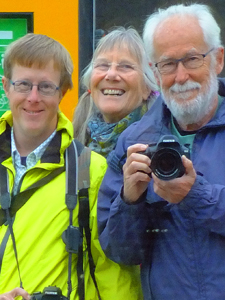EDSA – 30 years

EDSA 30th anniversary 1987-2017. Erik de Graaf, former director of the Stichting Down Syndroom in the Netherlands and one of the founders of EDSA, was asked to answer some questions and give some thoughts to the importance of EDSA for the dutch DS-organization during the last 30 years and for his own life with his son David.
Here his passionate statement:
What changes occurred for people with DS in the last 30 years?
Our son with Down syndrome, David, was born in 1984. Because of that, I can oversee the entire 30 years from the point of view of somebody with a personal relation.
- The image of Down syndrome in the media, and therefore with the public at large, in my opinion, has improved dramatically over the years. Down syndrome, of course, still is experienced as an issue deserving very serious consideration, notably for mothers-to-be, yet it is seen as a far less severe disability than it was 30 years ago. This can be illustrated by very recent Dutch research: the availability of the non-invasive prenatal test does not lead to more screening of pregnant women, as was originally anticipated.
- The medical condition of individuals with Down syndrome, at least in Western Europe, also has improved dramatically, e.g. because of the availability of better and better Preventive Medical Checklists and much improved operation techniques for e.g. heart surgery. There is no longer discussion whether a person with Down syndrome should be treated at all if there is a necessity. Because of this, many more persons involved can live lives without continuing additional medical problems.
- The functioning of individuals with Down syndrome is improved significantly due to their upbringing at home instead of in institutions and the application of effective early intervention programmes from baby stage followed by more and more inclusive education. As a group they have been discovered as an interesting, meaningful and promising research population. This has all been documented in well-conducted, large studies.
- A final strong gain in the field is the amount of research for medication to improve the functioning of individuals with Down syndrome in general. Consequently, the belief that someday there will be proven medication to improve this functioning in general is steadily growing.
What kind of role played EDSA?
EDSA has served in all those four aspects, mainly by means of extensive exchange of viewpoints and information. Getting to know the achievements’ of individuals with Down syndrome in other countries, and the ways in which they were achieved, has been very informative for all of us involved in EDSA. Horizons have been expanded steadily. Very many of these facts have been ‘translated’ in practical advice by EDSA member organisations in other countries. Via congresses and symposia (co-)organised or -hosted by EDSA as well as via corridor chats an enormous amount of information has been transferred between member organisations, resulting in better local medical checklists, etc. EDSA-contacts made possible internationally oriented research in the fields of e.g. demography, early intervention and inclusive education.
What should EDSA focus on in the future?
At its inception, EDSA had a peculiar and strong advantage, notably the equality of parents and professionals throughout all EDSA activities and ranks. However, in the course of the years, this equality had to be abandoned because of the unavailability of enough willing and able parents to participate with the available professionals. In addition, as a general trend, we see professionals, particularly so in the medical field, not only for Down syndrome, move away from parents, up to a ‘higher level’. In my opinion, this is an unfavourable development. Therefore, I would advise EDSA to focus on more equality of parents and professionals, both of them specialised in different aspects of the same children. For this case, there could be a role for parents who are professionals themselves.
What did EDSA mean to you? for your work and for you personally?
Particularly in EDSA’s first decade, the most difficult period for our Dutch Down syndrome foundation to come off the ground, EDSA has been a very important ‘beacon’ for me, time and time demonstrating that we were not on our own, but could remain on experience and help from member organisations in other countries. This has been extremely important for the improvement of the situation in The Netherlands. In later years we were much less ‘consumer’ and much more ‘particpant’, but still benefit significantly from the many contacts with and within EDSA.

